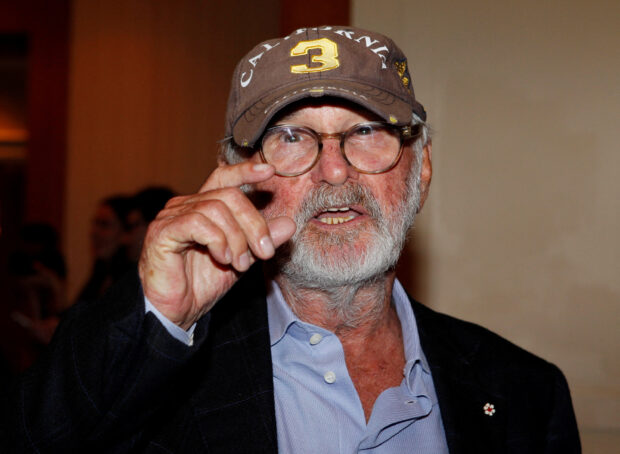Norman Jewison, director of ‘Moonstruck,’ ‘In the Heat of the Night,’ dies at 97

Academy Award-winning Canadian director Norman Jewison attends a luncheon hosted by the Consulate General of Canada to celebrate Canadian Oscar nominees at Los Angeles, Beverly Hills, Feb. 21, 2013. Image: Reuters/Fred Prouser
Canadian film director Norman Jewison, whose eclectic array of masterpieces included the 1967 racial drama “In the Heat of the Night,” the 1987 tart romantic comedy “Moonstruck” and the 1971 musical “Fiddler on the Roof,” has died at the age of 97, his publicist said.
Jewison, who was nominated three times for the Academy Award for best director and received a lifetime achievement Oscar in 1999, died at his home on Saturday, publicist Jeff Sanderson said on Monday.
The Toronto native, whose films also included the 1966 Cold War satire “The Russians Are Coming, the Russians Are Coming” and the provocative 1973 rock opera “Jesus Christ Superstar,” was considered one of the most important directors of the last four decades of the 20th century. He was widely admired for his ability to craft powerful films in many different genres.
His movies received 46 Academy Award nominations and won 12 Oscars. “In the Heat of the Night,” starring Sidney Poitier and Rod Steiger, won the best picture Oscar for 1967.
Jewison’s 1987 “Moonstruck” became one of Hollywood’s most popular romantic comedies. It tells the story of a Brooklyn widow, played by Cher, who agrees to marry a man she does not love and then falls in love with his brother, played by Nicolas Cage.
Article continues after this advertisementAfter Cage passionately tells Cher he loves her, she memorably slaps his face and scolds: “Snap out of it!” Cher won the best actress Oscar for her sassy performance.
Article continues after this advertisementJewison’s travels as a young man in 1940s America—seeing blatant white racism against Black people in the South—influenced his films, especially his three race dramas: “In the Heat of the Night,” “A Soldier’s Story” (1984) and “The Hurricane” (1999).
“In the Heat of the Night” focused on the relationship between a Black police officer (Poitier) and a white sheriff (Steiger) in a racist Southern town. The sight of Poitier’s character striking a rich white landowner shocked some moviegoers at that time.
Other important Jewison films included Steve McQueen entries “The Cincinnati Kid” (1965) and “The Thomas Crown Affair” (1968), dystopian corporate tyranny nightmare “Rollerball” (1975) and pregnant nun saga “Agnes of God” (1985).
Jewison remembered being taunted as a boy in Toronto by people who thought he was Jewish because of his name. He came from a Christian family, but the misperception persisted.
Unabashed liberal
Jewison was an unabashed liberal who took part in 1960s civil rights marches and knew former US attorney general Robert Kennedy and civil rights hero Martin Luther King Jr.
He drew the ire of some US conservatives. Tough-guy actor John Wayne was infuriated by Jewison’s 1966 “The Russians Are Coming, the Russians Are Coming,” a satire that depicts comic chaos in a New England town after a Soviet submarine runs aground.
“The drunker he got, the more he wanted to punch me out,” Jewison told Canada’s CTV News in 2009 of Wayne, who referred to him as the “Canadian pinko,” an anti-communist insult.
Jewison became disenchanted with US society after the assassinations of Kennedy and King in 1968 and moved out of the country.
“I lost my political idealism. So I left, took the family back to Canada and ripped up my green cards—something the kids still haven’t forgiven me for,” Jewison told the Ottawa Citizen in 2004, referring to permanent US residence status.
Jewison directed 12 different actors in Oscar-nominated performances, with Steiger winning for “In the Heat of the Night” and Cher and Olympia Dukakis winning for “Moonstruck.” He produced most of his movies as well as some by other directors.
He was nominated for best director Oscars for “In the Heat of the Night,” “Fiddler on the Roof” and “Moonstruck,” without winning, but in March 1999 was presented with the Irving G. Thalberg Memorial Award, honoring his career body of work.
“My parting thought to all those young filmmakers is this: Just find some good stories,” Jewison told the audience at that ceremony. “The biggest grossing picture is not necessarily the best picture. … So just tell stories that move us to laughter and tears, and perhaps reveal a little truth about ourselves.”
Norman Frederick Jewison was born in Toronto on July 21, 1926. He served in Canada’s navy during World War Two, became a TV director in Canada, then moved to New York in 1958 and made TV shows with stars including Judy Garland, winning three Emmy Awards.
Actor Tony Curtis coaxed Jewison into directing films, starting with the 1962 Curtis comedy “40 Pounds of Trouble.” Three more comedies followed before he got his shot at a meatier film by replacing director Sam Peckinpah on “The Cincinnati Kid.” He made his last movie, “The Statement,” in 2003. AP